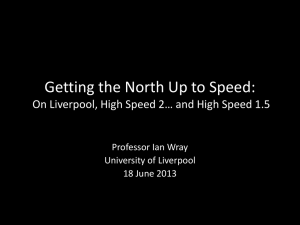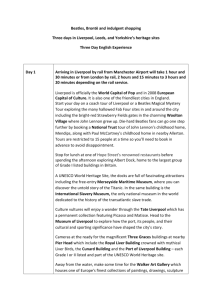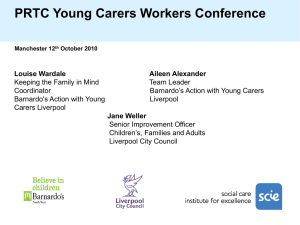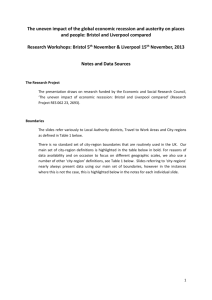here (Office document, 1329kB)
advertisement
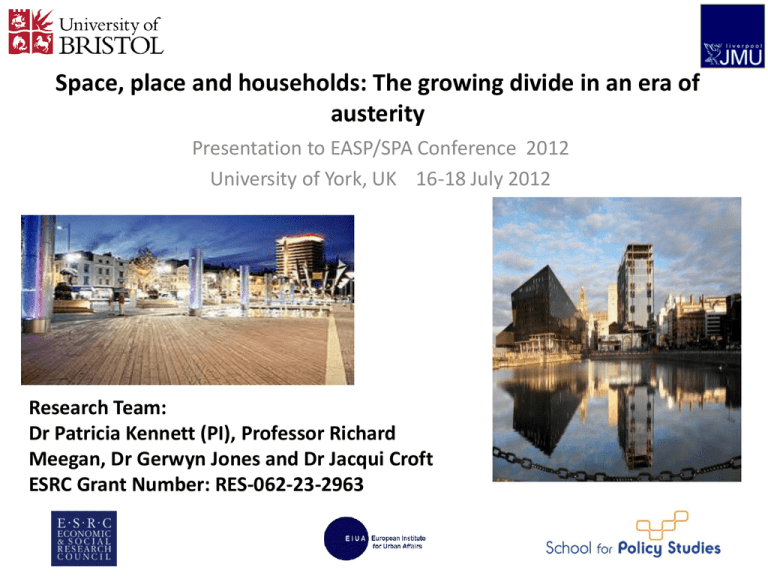
Space, place and households: The growing divide in an era of austerity Presentation to EASP/SPA Conference 2012 University of York, UK 16-18 July 2012 Research Team: Dr Patricia Kennett (PI), Professor Richard Meegan, Dr Gerwyn Jones and Dr Jacqui Croft ESRC Grant Number: RES-062-23-2963 Key issues • The differential implications of the economic downturn for cities and households and implications for social policy • De- and re-spatialisation of inequality and social differentiation • Social, ideological and moral shift • Deepening of divisions? Dual crisis • UK cities as `agents of world city network formation’ (Taylor 2004) • Economic revival, world connectivity and `engines of economic growth’ • Dual dynamic of financial and urban crisis (Aalbers 2012) -Finance led accumulation regime - Urban restructuring, expansion and speculation • Globalisation, cities and economic cycles The research • Highlight differential and uneven impact of economic crisis and austerity measures between cities and households • Social survey of 1,000 households conducted by Ipsos-MORI in 2011 in Bristol and Liverpool across 10 household types • Qualitative interviews with key stakeholders in Bristol and Liverpool Urban Contexts Bristol Liverpool • Research centre • Archetypal post-industrial city • Financial sector – banking, finance, insurance • Affluence / persistent deprivation • Population growth • Highly skilled and well qualified • Transport network and port • Long history of economic decline • Population decline • Concentration of deprivation • “Transformation pole” – reinventing • Capital of Culture 2008 • Growth in financial services, call centres • High level public sector employment Liverpool’s renaissance • ‘The city’s better off. [...] Or, at least, it’s – how shall I put it – it’s less desperately poor. The red bits on the map are starting to shrink. It’s gobsmacking.’[037] While another cited levels of economic growth: • ‘Well, it’s interesting for Liverpool because with economic growth in a city that has outstripped, um, both the UK and core cities’ average, recently Liverpool’s experienced, you know, Liverpool’s been going through this renaissance.’[036] % of population Category Wealthy Achievers Household groups: ACORN categories Urban Prosperity Comfortably Off Moderate Means Group Bristol Liverpool UK Affluent Greys 4.71 2.62 7.90 Flourishing Families 8.43 7.43 9.00 Educated Urbanites 4.88 1.67 5.50 Starting Out 7.23 1.34 3.10 Secure Families 16.32 19.41 15.50 Prudent Pensioners 3.50 3.28 2.70 Post-Industrial Families 9.90 4.54 4.70 Blue Collar Roots 7.52 10.60 7.50 Struggling Families 11.27 23.56 13.30 Burdened Singles 2.62 9.10 4.20 Hard Pressed Perceived changes in household finances 100.0% 6.0% 2.9% 13.4% 14.0% 90.0% 2.9% 7.1% 10.4% 9.4% 9.9% 21.2% 28.2% 80.0% 35.0% 34.5% 40.0% 70.0% 33.3% 30.2% 38.6% 35.0% 43.3% 29.8% 60.0% 50.0% Improved 40.0% Stayed the same 68.9% 62.1% 30.0% 54.0% 58.4% 47.1% 50.0% 54.2% Got worse 58.3% 50.5% 41.2% 20.0% 10.0% .0% .0% 1.9% 1.0% .0% 2.1% 2.1% 2.1% .0% 1.0% Affluent Greys Flourishing Families Educated Urbanites Starting Out Secure Families Prudent Pensioners Post-Industrial Families Blue-collar Roots Struggling Families Burdened Singles .0% Don't know Households’ ability to meet living costs 100% 90% 80% 21.0% 38.0% 35.9% 31.7% 15.6% 11.7% 19.8% 13.9% 27.4% 38.1% We have enough to live comfortably 28.2% 31.7% 70% 60% 45.8% 42.5% 50% 40% 50.0% 42.0% 43.0% 40.8% 44.2% 34.0% 39.8% 46.5% 30% 33.0% 20% 29.2% 27.1% We have enough just to meet basic expenses We don't have enough to meet basic expenses 16.0% 0% 3.0% .0% 2.9% .0% 4.8% .0% 4.0% .0% 4.4% .0% 6.2% .0% 5.2% .0% 7.3% .0% 2.9% 7.9% .0% Educated Urbanites Starting Out Secure Families Prudent Pensioners Post-Industrial Families Blue-collar Roots Struggling Families Burdened Singles 17.5% 10% Flourishing Families 19.2% 21.6% Affluent Greys 20.4% 25.7% We have enough to meet basic expenses with a little left over for extras Don't know Unemployment 16-24 year old age group (% unemployment rates) Local Government Finance Settlements Authority Estimated 201112 Revenue Spending Power (including NHS support for social care) Change in 201112 revenue spending power (%) (£million) Estimated 201213 Revenue Spending Power (including NHS support for social care) Change in 2011- Total Percentage 12 revenue Change 2011/12 spending power & 2012/13 (%) (%) (£million) Liverpool 563.819 -11.34 530.461 -7.14 -18.48 Knowsley 193.935 -10.77 183.017 -6.53 -17.30 Sefton 269.486 -6.76 255.807 -3.93 -10.69 Bristol 416.300 -3.62 398.510 -3.05 -6.67 North Somerset 165.705 -2.35 159.567 -2.37 -4.72 South Gloucestershire 204.817 -2.42 198.029 -2.21 -4.63 Source: DCLG Cuts in Spending Power vs Indices of Deprivation 50 LIVERPOOL 45 MANCHESTER IMD2007 Average district score http://www.communities.gov.uk/documents/communities/pdf/733520.pdf 11 BIRMINGHAM 40 NOTTINGHAM 17 16 35 14 30 2 30 BRISTOL 1 13 9 27 26 15 6 10 25 NEWCASTLE 8 29 24 SHEFFIELD 28 LEEDS 12 3,23,20, 7,21 18 5 4 20 22 15 25 19 Unitaries 10 London Boroughs Metropolitan Districts 5 0 0.00% Core Cities 1.00% 2.00% 3.00% 4.00% 5.00% 6.00% 7.00% 8.00% 9.00% Cuts after transition grant http://www.communities.gov.uk/documents/localgovernment/xls/1796201.xls 10.00% Complexity and diversity ‘[...] our sense was we had lots of professional people coming through, who you know had spent ... who’d been employed for a long time, and the idea of finding work and moving to a new job was completely you know anathema to them really, and they didn’t know how to go about applying for jobs, and they were completely unprepared for the way the job market is now.’ (Bristol) ‘I would say we really, really started noticing a change in the makeup of our client structure [...] about 3 years ago [...]. I noticed that we were no longer seeing just those people who are on a low level of income, who were on say a low level of employment income plus benefits, or just benefits alone – it was now people who had income from employment, who had a substantial asset as a property or a vehicle, who normally were sustaining their situation from their employment income, and maybe supplemented by some low level benefits, like child benefit for example.’ (Bristol) Increasing numbers, different groups ‘It’s not so much an increase in the type of issues that come through, ‘cos the issues have always been there and always will, it’s an increase in the numbers with those issues. And it’s the difference in the groups that are being affected as well, it’s people who’ve been in work all their lives, have got no knowledge of the benefit system ... and it’s getting more and more complex.’ (Liverpool) Respondents’ outlooks for the next 12 months 100.0% 8.0% 9.7% 12.6% 17.5% 90.0% 31.7% 12.6% 15.6% 29.0% 11.9% 30.2% 80.0% 70.0% 54.0% 60.0% 50.5% 58.4% 51.5% 47.9% 48.5% Improve 54.6% 50.0% 43.3% Stay the same 42.7% 47.0% 40.0% Get worse 30.0% 20.0% 27.1% 36.0% 34.0% 23.1% 10.0% .0% 2.0% 2.9% 32.0% 24.8% 1.9% 7.1% 1.0% 24.0% 25.8% 23.0% 9.4% 2.1% 33.7% 3.1% 3.9% 5.9% Don't know Final Remarks • Tensions and contradictions of `financial/urban’ complex not been addressed • Starker neo-liberal agenda impacting on cities and households in different ways • Recalibration of risk and responsibility • Economic and social vulnerability to uncertainties – resilience and resources





